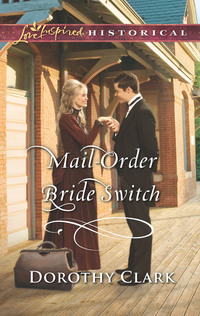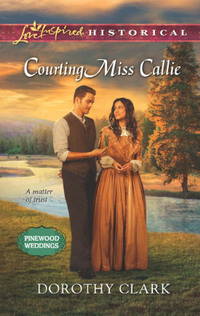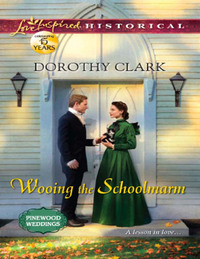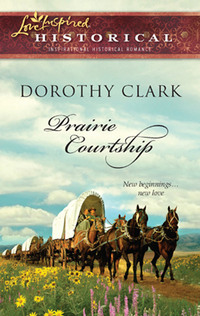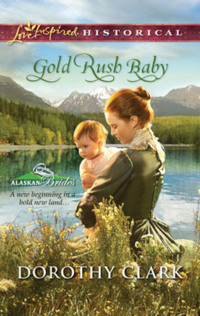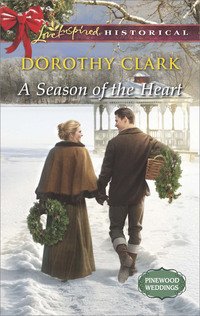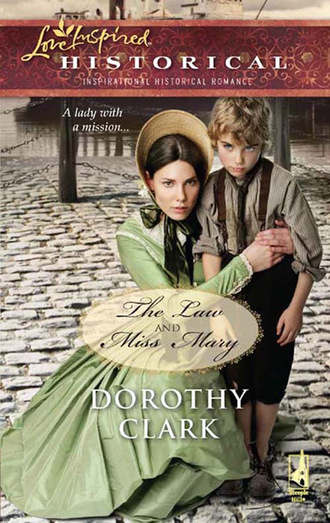
Полная версия
The Law and Miss Mary
Mary cast an assessing glance his way. “Now why was I certain you would ask me that very question as soon as the door closed behind Mr. Goodwin?” She lifted her hands and pulled out the pin holding her hat in place. “There! That is much better. I told Madame Duval these long ties would be annoying. But she insisted it was the latest style.”
James frowned. “And why did I know you would avoid answering me? If you are disappointed, Mary—if St. Louis is less than you expected—it would be best for you to return home now.” He flushed beneath her steady gaze. “I mean, rather than to unpack and have to go through all that work again.”
“How very sensible and considerate. But I had no expectations, James. Only an intense desire to leave Winston Blackstone behind. And every other man living in Philadelphia who knows father is wealthy, as well.” Her facial muscles went taut. She hated herself for believing Winston Blackstone’s lies. For opening herself up to be hurt by his perfidy.
She turned and dropped her hat onto the seat of a Windsor chair sitting beside the fireplace. It gave her a reason to turn her back on the sympathy in James’s eyes. She should not have mentioned Winston. She hastened to change the subject. “And, in truth, I find St. Louis intriguing. Did you notice all those rough-looking, buckskin-clad men? And the Indians roaming about the levee mingling with the people? Do you suppose they are dangerous?”
“I am quite certain they can be.”
She heard James move, listened to his footsteps draw close. She removed her gloves and tossed them down by her hat.
“Winston did not mean to hurt you, Mary. He did not mean for you to ever know about Victoria. He was doing the honorable thing and telling her goodbye.”
Mary clenched her hands into fists. She had avoided talking about Winston ever since the night of the party. But James persisted. Perhaps if she explained he would stop trying to make her talk about what had happened. And perhaps it would cleanse her mind of the memories, free her to move on with her new life.
She turned around and studied her brother’s face. “Why are you so determined to discuss Winston, James? You have been trying to do so our entire journey. Did Mother and Father charge you with the task?” She squared her shoulders and lifted her hand to stop his reply. “No matter. I will bow to your wishes and we shall discuss Winston and the entire sordid situation—” she pointed one long, tapering finger toward the ceiling “—once. But do not dare defend him to me. Do not stand before me and call his actions honorable.”
The word scorched her tongue, seared her heart. She took refuge from her pain in a sudden burst of anger. Allowed the heat of it to carry her words beyond the lump of hurt in her throat. “I saw Winston with Victoria in the gardens, James. And, I assure you, there was nothing lofty or honorable in their embrace. Nor did the ardor of his kisses speak goodbye—except to the announcement of our betrothal.” She lifted her chin and hid her trembling hands in the deep folds of her long skirt. “At least I was spared the humiliation of a public betrayal. Although everyone present that evening did suspect the reason for the party was to announce our future marriage.”
“Mary, I had no idea!” James hurried to her. “Why did you not tell us you had witnessed Winston and Victoria embracing in the gardens?” He reached to pull her close.
She stepped back and shook her head. If he put his arms around her, she would burst into tears. “And have all my family pity me even more? As you are doing now?” She turned away, brushed a stray lock of hair off her cheek. “It changed nothing that I saw Winston’s betrayal with my own eyes.”
“I suppose that is true. Though it may make it more difficult for you to forgive him.”
“Forgive him?” She pivoted, stared up at him. “You are not serious, James?”
“Yes, I am.” He stepped closer. “Listen, Mary. When you refused to see him before we left, Winston came to me and explained the entire situation. He confessed it was only after losing you that he realized how much he cared for you. He begged me to plead his case with you. Of course, I refused. But he convinced me that he is genuinely distraught at losing you.” Warmth from his hands penetrated the fabric of her gown as he took hold of her shoulders. “Mary, Winston loves you and wants you back. He wants you to come home to Philadelphia and marry him. It is that which I have been trying to tell you the entire journey.”
“He—He said—And you—” Her throat closed on the words. Mary dug her fingernails into the palms of her hands, fighting a sense of betrayal that was not fair to her brother. He did not know the entire story. She took a breath, held it, released it slowly. “I know you wish only what is best for me, James. And I thank you for that. Truly. But do not be swayed by Winston’s persuasive powers. His only regret is in losing the generous dowry Father offered for me. It would have cleared all his debts. I know, for I not only saw Winston with Victoria, I heard him as well.” She lifted her hand and tapped his chest. “Winston’s pocketbook chose me, James. His heart chose Victoria.” She made herself look at him and forced the rest of it out of her constricted throat. “And, as he said to her, ‘What man would not choose her petite, blond beauty and sweet nature over my dark, angular plainness and bold, forthright ways were debt not an issue?’”
Anger darkened James’s face. His chest swelled beneath her hand as he sucked in air. She blinked the sting of tears from her eyes and shook her head. “Do not say more, James. Please. Do not make useless protests. Winston’s words only confirmed what I have known all my life. I am aware of how I appear in comparison to other women. It has always been so. Mother and Sarah shine like golden jewels. But it is only Father’s wealth that gives me beauty and luster in men’s eyes. And I, like every woman, want to—to be a jewel in the eyes of the man I love. Me—not Father’s money. I want to marry a man who loves and values me for myself. And I will settle for no less.”
“You are wrong, Mary!” James tightened his grip, gave her a gentle shake. “You are a lovely and desirable woman. And Winston Blackstone is a fool! As am I for believing him. He does not deserve you.”
She touched her fingers to his lips, saw the hurt for her in his eyes, and forced a smile. “You are a wonderful, loyal brother, James. But please, do not be concerned for me. Perhaps somewhere there is a man—even here in St. Louis—who will see me as a jewel. And with no one here knowing who our father is, should such a man declare his love for me, I will be certain he cares for me alone. That is why it is so perfect that no one here knows of our father’s wealth. And if that does not happen—” she took another breath “—I will yet be glad I came. For I would far rather be a spinster than a bargain. Now…we shall never mention Winston Blackstone again.” She raised her face, kissed his cheek and spun away. “Shall we explore our new home?”
“That shan’t take long.”
The wry humor was forced. Mary sent James a look of gratitude for accepting the change of subject and picked up her hat and gloves. “Shall we start with the upstairs? I want to put this ridiculous hat away.”
Chapter Three
Her first full day in her new home. Mary heaved a sigh and looked around her. What was she to do with her gowns? Her dressing room at home was larger than this bedroom. And her bedroom was—No. No complaints. Not even to herself. She had begged to come to St. Louis with James, and her parents had granted her wishes. She would not turn into a whining scold because of a few lost comforts.
She marched to the cupboard built into the niche on the left side of the fireplace and opened the door. There was room for five, perhaps six dresses, plus her nightgown and robe. She turned, fisted her hands on her hips and nibbled at the left inside corner of her top lip. She would need her plainest day dresses. And a finer one for church. The rest of her gowns would simply have to stay in the trunks. But where would she store them? Another dilemma.
“What is all this?”
Mary turned toward the door, took one look at James’s baffled expression and burst into laughter. “I am choosing gowns to keep here in my room. The rest must stay in the trunks. I have no thought as to where—James! The office. Do you suppose there would be room in the back to store my trunks?”
“Perhaps. I will know after I see the place. I came to tell you that I am going there now.” A frown crossed her brother’s handsome face. “I have been thinking about those Indians we saw yesterday, Mary. I am concerned about leaving you here alone.”
“Oh, poof!” She waved his concern away and lifted her rose-colored cotton gown from a pile on the bed. The matching embroidered jacket would come in handy for cooler days. “I will be fine. Mrs. Rawlins and Mrs. Dengler will be coming soon for their interviews. And, meanwhile, if any Indians come in with intent to do me harm, I shall simply hide myself in one of these stacks.” She laughed and swept her hand through the air, indicating the dresses heaped on the floor, draped over the open trunks and spread out on the bed. “They would never find me.”
James laughed, then sobered. “You are certain?”
“Yes! Now go, and leave me to my work.”
Mary sat on the settee, smoothed out her skirt and smiled at the women perched on the Windsor chairs. “I am impressed with the cleanliness of the house, Mrs. Dengler. I would very much like for you to continue to clean for us.”
The German woman smiled and dipped her head. “Dank.”
“And what is your given name, Mrs. Dengler?”
“I am called Edda.”
Mary smiled at the older woman. “Are you prepared to begin work today, Edda?”
“I can do work today, ja.”
“Wonderful.” Mary held back a sigh of relief. “There are gowns in my bedroom that must be packed away in my trunks for storage. When you finish with them, I would like you to make the beds.”
“Ja, Miss Randolph.”
Edda walked to the stairs and Mary turned to the woman on the other chair. “The stew you prepared for me and my brother last night was delicious, Mrs. Rawlins. As were the rolls that accompanied it. Do you always do your own baking?”
“Yes, I do.”
“And are you available to cook for us every day?”
“I am.” The woman nodded. “I am a recent widow with children full grown and gone from home. I have no call on my time.”
Mary’s heart contracted at the sorrow on the woman’s face. “I am sorry for your loss, Mrs. Rawlins.”
The woman dipped her head.
“Are you able to take up your duties today?”
Relief spread across the woman’s face. “Yes, Miss Randolph. And my name is Ivy.”
Mary smiled and rose to her feet. “I have paper and pen waiting in the kitchen, Ivy. If you will tell me what stores you require and what foods you wish for today’s meals, I will see to their purchase.”
The sun overhead was bright in her eyes. Mary dipped her head slightly, using the shirred brim of her coal-scuttle bonnet to shade her face. The deep flounce running around the bottom of the long, full skirt of her green gown brushed against the cobblestones as she walked down Market Street toward the river, the basket she had found in the kitchen swinging back and forth in her hand.
The sounds of activity on the levee became louder and more distinct as she neared the river. Wind gusted, picked up dust and flung it about. She ducked her head against the onslaught, hurried around the corner toward the Mississippi and Missouri steamer line office building and ran full tilt into a muscular, lean body. “Oh!” She staggered backward. Strong hands gripped her upper arms, steadied her. She looked up to thank her rescuer.
“Captain Benton!”
“At your service.” He released her arms. “Are you all right, Miss Randolph?”
The heat of a blush crawled across her cheeks. “I should ask you that question, Captain. Please forgive me. I assure you I am not in the habit of knocking into people. I was…well…I was hurrying to reach my brother.” She gave a little laugh and straightened her bonnet that had slipped backward when she had bumped into him. “Our cook has given me a list and I am on my way to purchase needed stores and food for dinner. And, I confess, I am a little hesitant to brave the levee area without an escort.”
She glanced up at him from under her hat brim. Gracious, he was tall! She was not accustomed to men tilting their heads to look down at her. “I am unfamiliar with Indians or mountain men, and I am not eager to meet any of them on my own. At least, not yet. Thus, I was on my way to ask James to accompany me to the grocer’s.” She was prattling like a silly schoolgirl in the presence of a handsome boy! Mary clenched her teeth together and tightened her grip on the empty basket.
“Very wise of you, Miss Randolph.”
His calm answer restored her aplomb. “And why is that, Captain?”
“There are some rough and unsavory elements on the waterfront. We are working to clean up our city. But there is much left to do.”
“I see.” Mary hid the tingle of apprehension that slipped along her nerves and turned toward the office door. “Thank you for the information, Captain. Now I know I need James to accompany me.”
A frown lowered his straight, dark brown brows. “I just called to speak with your brother, Miss Randolph. He is in a meeting.”
“But Mrs. Rawlins needs—” Mary stopped, glanced at Front Street and took a deep breath. “Would you please direct me to the grocer’s, Captain?”
“I will do better than that, Miss Randolph. I will escort you there.”
“You?” Mary jerked her gaze to him.
He grinned, no doubt at her response. A slow, lopsided sort of grin that did queer things to her stomach. She took a step back, suddenly uneasy at the prospect of being in his company. The man was overwhelming. And why would he offer to escort her? “It is most kind of you to offer aid, Captain. But it would not be right for me to take you from your duties.” She glanced up and down the street to choose her direction.
“The well-being and safety of the citizens of St. Louis is my duty, Miss Randolph. Allow me.” He reached out and took hold of the basket. “If you are ready?”
His answer left her without argument, but did little to allay her unease. Mary glanced at him, then looked down at his hand gripping the handle. Unless she wanted to engage in a tug-of-war for the basket—a contest she was sure to lose since the man was twice her size—she had no choice. She released her grip on the basket.
“We need to cross Market Street.” He held her elbow.
Mary forced herself to relax. She was being ridiculous. He had not offered to help her from some nefarious motive. It was a simple politeness. A duty. Not every man had a hidden agenda like Winston Blackstone. She walked to the curb beside him, tried not to feel delicate and protected as he guided her through the carriage traffic. But it was difficult not to feel that way with his tall, lean body shielding her, and his hand holding her so protectively. She gave a quiet sigh of relief when they reached the other side and he released her arm. She glanced around as they started down the walkway.
“Are you recovered from your journey, Miss Randolph?”
She nodded, gave him a polite smile. “Yes. Quite recovered, thank you.”
“You are fortunate. Steamboats are a vast improvement on other river craft, but still, long trips can be exhausting.” He smiled down at her. “If you don’t mind my asking, where are you and your brother from, Miss Randolph?”
“Philadelphia” sprang to her tongue, but was quashed by another spurt of caution and suspicion. Why did he want to know? Did it have something to do with being a police officer? Well, she had no intention of telling him. That information might lead to her father’s identity. The Randolph shipping line was well-known in Philadelphia. She glanced up, gave a graceful little shrug. “Why ever would I mind your asking, Captain? We are from Pennsylvania.” She shifted her gaze. “Oh, look! A bookstore. How lovely.” She gave him another polite smile. “Do you enjoy reading, Captain?”
“I do. Though I seldom have time.”
Some subtle change in the timbre of his deep voice warned her that he was aware of her evasion. She turned her head toward the two-story brick, stone and wood frame storefronts to hide her face from him. Those blue eyes were too observant.
A half-naked Indian, a pile of animal pelts folded over one arm, exited a leather goods store, then mingled with the people on the walkway and strode straight toward them. Mary froze, staring at the shocking sight of the Indian’s bare torso. She had heard so many stories…His eyes, black as a night sky, bored into hers. She lifted her chin and crowded closer to Captain Benton, suddenly thankful for his presence. The Indian went on by.
“There’s no danger, Miss Randolph. We’ve been at peace with the local Indians for many years. They come into town often to conduct business.” He smiled down at her. “I know it is a shock to you Easterners at first, but their presence is a sight you will soon become accustomed to.”
His smile and the calm in his deep voice eased her nervousness. She nodded, looked away from his disturbing, penetrating gaze. “I am certain I shall, Captain Benton.” She started walking again. He fell into step beside her.
“The plains tribes are a different matter, of course. But you are safe in town.”
A shiver slithered down her spine. She glanced at him, uncertain of how to respond. Up to now, hers had been a pampered life. She was not used to feeling afraid.
“Stop, you little thief!”
Mary jerked her gaze forward. A young boy, panic on his face, was running toward them, a large man wearing a stained white apron in hot pursuit.
Samuel Benton leaped into the boy’s path.
The boy tried to swerve, but the man behind him thrust out his hand, caught the boy’s shoulder and yanked him to a halt. “Got ya! Now, you’ll find out what thievin’ gets ya!” He nodded at Samuel Benton and shoved the boy forward. “Throw ’im in jail with the rest of the thievin’ jackanapes, Captain.”
“Surely not!” Mary rushed forward, lifted her chin as both men looked her way. “He is only a boy.”
“He’s a thief! An’ here’s yer proof.” The man grabbed the boy’s right arm and jerked it upward. There was a crushed roll in his hand. A bony hand, attached to a pitifully thin arm.
Mary gasped. “Why, the boy’s half-starved!” She glanced up at Samuel Benton. “He is hungry, Captain. Surely you will not arrest him?”
The captain’s blue eyes darkened. “That is my job, Miss Randolph. He broke the law. The reason does not matter.” He reached for the boy.
Mary stepped between them. “It matters to me, Captain.” She stared up at him, at his darkened eyes, his set jaw and drew herself to her full height. “But I can see there is no room in your St. Louis law for mercy.” She pivoted to face the vendor. “Unhand the boy, sir. I will pay for his roll.”
Hope leaped into the boy’s eyes. But the man in the apron let out a growl, tightened his grip on the boy’s skinny shoulders and looked over her head. “You do yer job an’ throw ’im in jail, Captain. There’s too many of the rapscallions roamin’ the streets an’ stealin’ from hardworkin’, decent people now. Y’ let this ’un go, an’ the rest of ’em’ll be swarmin’ around our stores like bees o’er clover.”
“There is no theft if Miss Randolph pays for the roll, Simpson.” Samuel Benton’s deep voice rolled over her shoulder. “Release the boy.”
“Wait!” Mary winced inwardly as the hope faded from the boy’s eyes, but he was going to run the moment he was free, she could see it on his face. And she saw something else written there, as well. Shame. And defiance. She fastened her gaze on him. “I need someone to carry my purchases home, and I thought perhaps you would do that for me, young man. In exchange for your services, I will buy you a thick slab of cheese to go with that roll. Is that agreeable to you?”
Pride replaced the shame. The defiance gave way to caution. The boy drew himself up straight and nodded.
“Very well.” She handed the man behind the boy a coin. “You may release him now.”
The man scowled, lifted his hands from the boy’s shoulders and walked away, grumbling beneath his breath.
The boy stayed.
Mary let out a breath of relief and turned to Samuel Benton. “Thank you for your help, Captain. But I no longer require your aid.” She did not bother to hide her disgust at his treatment of the boy. “If you will please give this young man my basket and tell me where the grocer is located, we shall be on our way.”
He stared down at her for a moment, then dipped his head. “As you wish, Miss Randolph.” He handed the basket to the boy, then returned his gaze to her and made a slight bow. “Good day, Miss Randolph. You have no need of my direction. The boy knows the location of the store. Mr. Simpson is the grocer.” He turned and walked away.
Mary watched his lean, broad-shouldered figure disappear into a nearby store, chiding herself for the disappointment weighting her stomach. What did it matter what sort of man Samuel Benton was? The captain was nothing to her.
Chapter Four
Mary looked down at the young boy clutching her basket and smiled. “And thus, we are left on our own. Where is Mr. Simpson’s store—” She shook her head and gave a little laugh. “I cannot keep calling you ‘young man.’ What is your name?”
The boy stiffened, his nostrils pinched slightly, his eyes narrowed and his mouth firmed as he stared up at her. Had she looked that wary when Captain Benton questioned her? No wonder he knew her answer was an evasion. She kept silent as the boy studied her. After a few moments, he relaxed a little, gave a small shrug. “Name’s Ben.” He pointed a bony finger down the street. “Yonder is the grocer’s.” He lowered his hand and gripped the basket handle. Probably to hide his trembling.
Mary started walking, letting out a quiet sigh of relief when Ben fell into step beside her. He had looked poised to run, and if he decided to do so, she could not stop him. Her lips twitched at the idea of her raising her long skirts and darting among the shoppers on the walkway chasing after the boy.
A puff of wind swirled up from the river, lifting a sour odor from Ben. She held her breath, waiting for the gust to cease, and glanced down. Tears filmed her eyes at the close sight of Ben’s grimy skin, the clumps of dirt and straw in his matted hair, his dirty and torn clothes. She guessed him to be nine, perhaps ten years old. So young. And so horribly thin. Had he no one to care for him?
Thoughts of the homeless children brought to her aunt Laina’s orphanage in Philadelphia crowded into her head. The tears in her eyes threatened to overflow. Was Ben an orphan? She blinked the tears back, released her breath and focused on the situation. Ben needed help, not pity. And she needed information. It was possible he had parents—though his unkempt, half-starved condition made it seem unlikely.
She stole another look at the silent boy. He was so easily frightened, so ready to run. How should she start? I always mask my questions with friendly conversation. Of course! How many times had she heard her aunt Laina say that? Mary smiled, looked down. “I like the name Benjamin.” She made her tone of voice light, friendly. “Is it a family name? Perhaps your father’s?”
No answer.
She tilted her head to get a better view of the boy’s face. His lips were pressed together and he was blinking rapidly. Her heart seized. “Ben—”
“This is the store.” He shot across the walkway, stopped by a store’s open door and looked back at her.
“Go away, you ragamuffin!” A woman loomed out of the darkness of the store, pausing in the doorway. “Urchins like you are not welcome around decent people! Go away, I say!” She made shooing motions with her hands, then drew her long skirts close so they wouldn’t touch Ben before she started out of the store.


